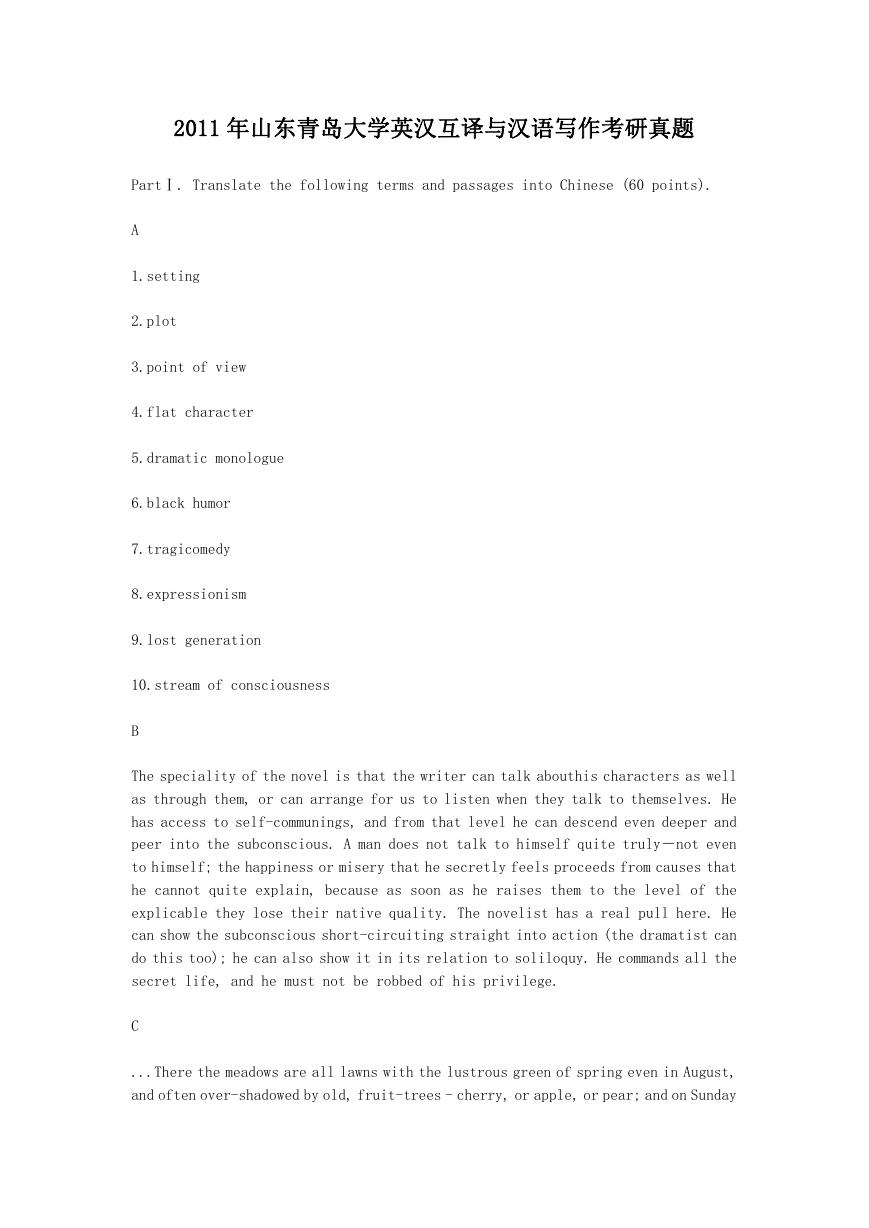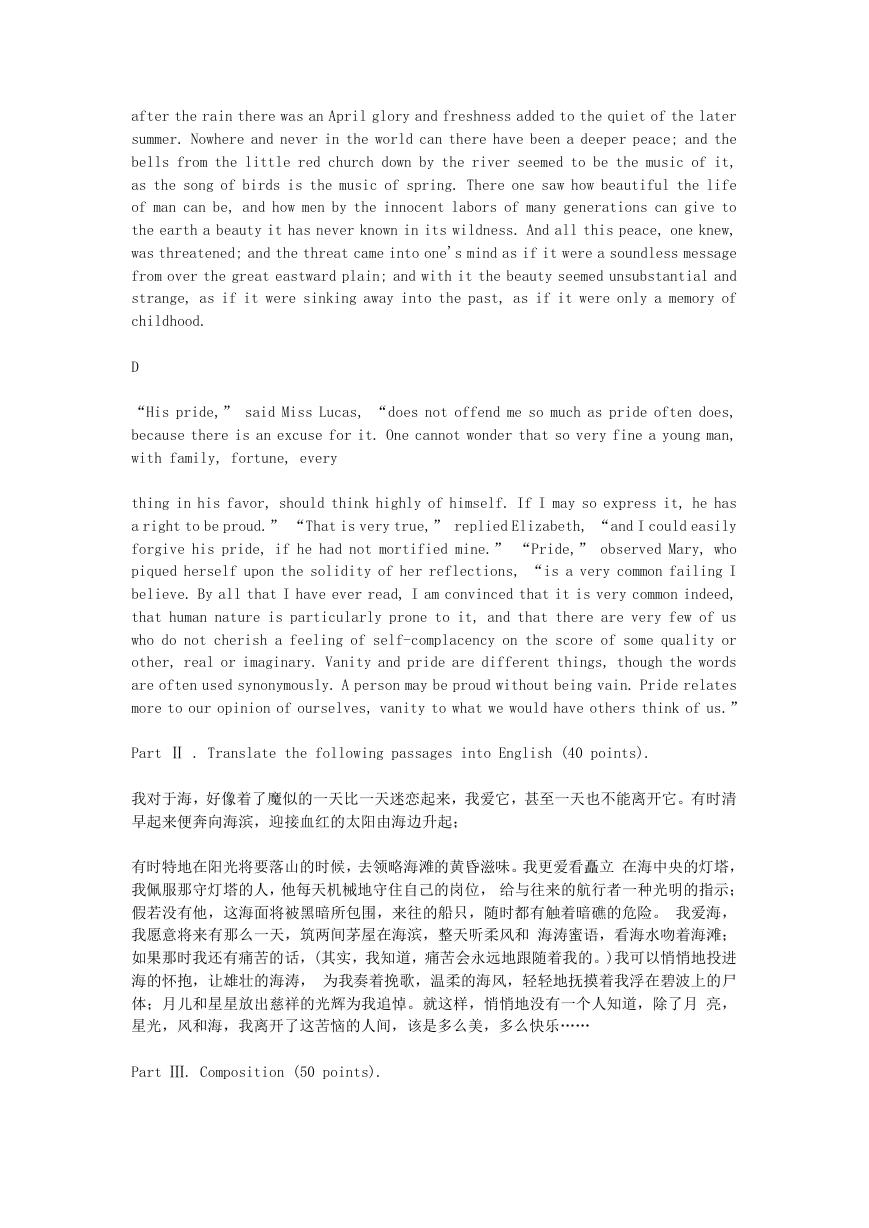2011 年山东青岛大学英汉互译与汉语写作考研真题
PartⅠ. Translate the following terms and passages into Chinese (60 points).
A
1.setting
2.plot
3.point of view
4.flat character
5.dramatic monologue
6.black humor
7.tragicomedy
8.expressionism
9.lost generation
10.stream of consciousness
B
The speciality of the novel is that the writer can talk abouthis characters as well
as through them, or can arrange for us to listen when they talk to themselves. He
has access to self-communings, and from that level he can descend even deeper and
peer into the subconscious. A man does not talk to himself quite truly-not even
to himself; the happiness or misery that he secretly feels proceeds from causes that
he cannot quite explain, because as soon as he raises them to the level of the
explicable they lose their native quality. The novelist has a real pull here. He
can show the subconscious short-circuiting straight into action (the dramatist can
do this too); he can also show it in its relation to soliloquy. He commands all the
secret life, and he must not be robbed of his privilege.
C
...There the meadows are all lawns with the lustrous green of spring even in August,
and often over-shadowed by old, fruit-trees - cherry, or apple, or pear; and on Sunday
�
after the rain there was an April glory and freshness added to the quiet of the later
summer. Nowhere and never in the world can there have been a deeper peace; and the
bells from the little red church down by the river seemed to be the music of it,
as the song of birds is the music of spring. There one saw how beautiful the life
of man can be, and how men by the innocent labors of many generations can give to
the earth a beauty it has never known in its wildness. And all this peace, one knew,
was threatened; and the threat came into one's mind as if it were a soundless message
from over the great eastward plain; and with it the beauty seemed unsubstantial and
strange, as if it were sinking away into the past, as if it were only a memory of
childhood.
D
“His pride,” said Miss Lucas, “does not offend me so much as pride often does,
because there is an excuse for it. One cannot wonder that so very fine a young man,
with family, fortune, every
thing in his favor, should think highly of himself. If I may so express it, he has
a right to be proud.” “That is very true,” replied Elizabeth, “and I could easily
forgive his pride, if he had not mortified mine.” “Pride,” observed Mary, who
piqued herself upon the solidity of her reflections, “is a very common failing I
believe. By all that I have ever read, I am convinced that it is very common indeed,
that human nature is particularly prone to it, and that there are very few of us
who do not cherish a feeling of self-complacency on the score of some quality or
other, real or imaginary. Vanity and pride are different things, though the words
are often used synonymously. A person may be proud without being vain. Pride relates
more to our opinion of ourselves, vanity to what we would have others think of us.”
Part Ⅱ . Translate the following passages into English (40 points).
我对于海,好像着了魔似的一天比一天迷恋起来,我爱它,甚至一天也不能离开它。有时清
早起来便奔向海滨,迎接血红的太阳由海边升起;
有时特地在阳光将要落山的时候,去领略海滩的黄昏滋味。我更爱看矗立 在海中央的灯塔,
我佩服那守灯塔的人,他每天机械地守住自己的岗位, 给与往来的航行者一种光明的指示;
假若没有他,这海面将被黑暗所包围,来往的船只,随时都有触着暗礁的危险。 我爱海,
我愿意将来有那么一天,筑两间茅屋在海滨,整天听柔风和 海涛蜜语,看海水吻着海滩;
如果那时我还有痛苦的话,(其实,我知道,痛苦会永远地跟随着我的。)我可以悄悄地投进
海的怀抱,让雄壮的海涛, 为我奏着挽歌,温柔的海风,轻轻地抚摸着我浮在碧波上的尸
体;月儿和星星放出慈祥的光辉为我追悼。就这样,悄悄地没有一个人知道,除了月 亮,
星光,风和海,我离开了这苦恼的人间,该是多么美,多么快乐……
Part Ⅲ. Composition (50 points).
�
Write an article entitled “To Read Classics and to Have Dialogues
with Masters” (《阅读经典,与大师对话》) in Chinese.
�






 2023年江西萍乡中考道德与法治真题及答案.doc
2023年江西萍乡中考道德与法治真题及答案.doc 2012年重庆南川中考生物真题及答案.doc
2012年重庆南川中考生物真题及答案.doc 2013年江西师范大学地理学综合及文艺理论基础考研真题.doc
2013年江西师范大学地理学综合及文艺理论基础考研真题.doc 2020年四川甘孜小升初语文真题及答案I卷.doc
2020年四川甘孜小升初语文真题及答案I卷.doc 2020年注册岩土工程师专业基础考试真题及答案.doc
2020年注册岩土工程师专业基础考试真题及答案.doc 2023-2024学年福建省厦门市九年级上学期数学月考试题及答案.doc
2023-2024学年福建省厦门市九年级上学期数学月考试题及答案.doc 2021-2022学年辽宁省沈阳市大东区九年级上学期语文期末试题及答案.doc
2021-2022学年辽宁省沈阳市大东区九年级上学期语文期末试题及答案.doc 2022-2023学年北京东城区初三第一学期物理期末试卷及答案.doc
2022-2023学年北京东城区初三第一学期物理期末试卷及答案.doc 2018上半年江西教师资格初中地理学科知识与教学能力真题及答案.doc
2018上半年江西教师资格初中地理学科知识与教学能力真题及答案.doc 2012年河北国家公务员申论考试真题及答案-省级.doc
2012年河北国家公务员申论考试真题及答案-省级.doc 2020-2021学年江苏省扬州市江都区邵樊片九年级上学期数学第一次质量检测试题及答案.doc
2020-2021学年江苏省扬州市江都区邵樊片九年级上学期数学第一次质量检测试题及答案.doc 2022下半年黑龙江教师资格证中学综合素质真题及答案.doc
2022下半年黑龙江教师资格证中学综合素质真题及答案.doc